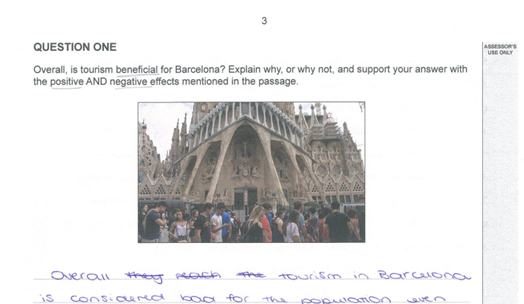With the opportunities that taking NCEA Spanish can provide, both professionally and personally, you want to make sure that you are getting the most out of your class. Even more importantly, you want to make sure you pass NCEA Spanish! For Kiwi students, one of the best ways to ensure you pass, and with an Excellence endorsement, is to use the past exam papers and assessments to help you revise.

Finding Last Year’s Spanish Exam
Hopefully, your teacher has provided at least one past year exam for you to become familiar with the format. However, when reviewing your understanding, you can access exams and notes from the last few years of NCEA Spanish on the NZQA website.
From the website, you will want to head over to the subject guide and look for NCEA Spanish. Here, you will see the available resources for each level. You might want to download just one exam at the start of the year and keep testing yourself with it to monitor your progress. As you work your way through the course, you should see where your understanding is growing and if you have areas that you are really struggling with.

Understanding the NCEA Spanish Level System
Each level of NCEA Spanish is designed to build on your previous knowledge. So while technically you might be able to pick up NCEA Level 3, you would need to have had some exposure and experience with Spanish elsewhere to pass.
Looking through this table provided by the Ministry of Education, you can see how the basic requirements get marginally more difficult at each level. As your vocabulary improves and you can discuss more complex ideas, there is an expectation that you will use your abilities to communicate more expressively. You will be expected to move relatively quickly from being able to introduce yourself to being able to share the culture, beliefs and background that has made you the person you are.
| Level 1 | Level 2 | Level 3 | |
|---|---|---|---|
| Listen and Respond | Demonstrate understanding of a variety of spoken Spanish texts on areas of most immediate relevance. | Demonstrate understanding of a variety of spoken Spanish texts on familiar matters. | Demonstrate understanding of a variety of extended spoken Spanish texts. |
| Speak, Present | Give a spoken presentation in Spanish that communicates a personal response. | Give a spoken presentation in Spanish that communicates information, ideas and opinions. | Give a clear spoken presentation in Spanish that communicates a critical response to stimulus material. |
| Interact | Interact using spoken Spanish to communicate personal information, ideas and opinions in different situations. | Interact using spoken Spanish to share information and justify ideas and opinions in different situations. | Interact clearly using spoken Spanish to explore and justify varied ideas and perspectives in different situations. |
| View and Respond | Demonstrate understanding of a variety of Spanish texts on areas of most immediate relevance. | Demonstrate understanding of a variety of written and/or visual Spanish text(s) on familiar matters. | Demonstrate understanding of a variety of extended written and/or visual Spanish texts. |
| Write | Write a variety of text types in Spanish on areas of most immediate relevance. | Write a variety of text types in Spanish to convey information, ideas, and opinions in genuine contexts. | Write a variety of text types in clear Spanish to explore and justify varied ideas and perspectives. |


Improving your Spanish Communication Skills
You cannot effectively learn a language in a silo. To learn effectively, you need to discover a language within a cultural context – and if you’re lucky, this could mean enjoying a lot of Spanish food. At the very least, you will get to enjoy Spanish movies, music, and humour – and once you can understand the humour of another culture can say you have an excellent grasp of the language.

Listening to NCEA Spanish Audio
We are lucky in New Zealand; our education department not only provides us with past exams to go through but includes the original audio we can listen to and the transcript so we can verify what we are hearing!
This means that you can download the audio for a listening component and play it repeatedly until you hear each distinct word and understand what is being said. You can then download the audio transcript to ensure that you are correct. For example, one passage of the NCEA Spanish Level 2 audio track transcript from the 2021 exam shares this passage:
FIRST PASSAGE – SECTION 1
READER 2
Todos los 23 de abril se celebra el Día Mundial del Idioma Español como conmemoración de la importancia del español como lengua internacional, ya que hay más de 450 millones de hispanohablantes en el mundo. Este día nos hace pensar en la importancia de aprender otros idiomas y las ventajas que traen.
Vocabulary Lists
All the vocabulary that you will be expected to know at your level is available on the NZQA Spanish website. You can use methods such as “power ten”, “chunking”, “mnemonics”, or flashcards to help you memorise the word lists. However, understanding and using these words will be an essential part of your study and revision.
One thing with all NCEA Spanish levels is that you will be tested in real-world examples. This can be more challenging than learning from a ‘textbook’ created example. Still, it does allow you to learn and communicate effectively at a much faster pace.

Using Spanish Exemplars To Pass Exams
Every exam paper provides details at the start about what will be required to pass, pass with Merit, and pass with Excellence. Understanding what is being asked of you is one thing, but you also need to know how to achieve what the assessor is after.
Going through old exams to test your understanding of the language is a great way to build your confidence and communication ability. However, going through the exams that include examples of how students have answered them and how they were marked gives an excellent insight into how you can achieve an Excellence endorsement.
Have a look at the exemplar for “91568 Demonstrate understanding of a variety of extended spoken Spanish texts”, a Level 3 NCEA Spanish paper offered in 2019. You need to listen to a spoken piece in Spanish then answer questions about it. You can make notes as you listen, and you will get to hear the part three times.
This is the difference between the three pass types:
Achievement:
Demonstrate understanding of a variety of extended spoken Spanish texts.
Achievement with Merit:
Demonstrate clear understanding of a variety of extended spoken Spanish texts.
Achievement with Excellence:
Demonstrate thorough understanding of a variety of extended spoken Spanish texts.
Being able to show that you thoroughly understood what was being discussed is only part of the issues; you must be able to show that you thoroughly understood. When you look at the Spanish exemplar, the student has underlined the keywords they felt were important to focus on in their answer.

The student was given the grade E7 for this question, and the assessor was able to make the comments that:
This question is E7 because the candidate has picked up on the majority of points mentioned in the text and also correctly inferred that overall, according to the speakers, tourism is negative. They have also been able to infer information and give specific complex detail when justifying.
For example:
- so many tourists make public transport (i.e. metro) too full
- tourists staying in apartments and flats is bad for hotels
- the culture is reduced to stereotypes and tourists are looking for a concrete image of Spain that Barcelona doesn’t fit into
- the employment is precarious due to its seasonal nature and that at the end of it people lose their jobs.

Finding Spanish Learning Support
By the time you are looking at NCEA Spanish exemplars and revising from old exam papers, you should probably already be looking at working with a tutor. This doesn’t have to cost a fortune, nor is it something that needs to use all your spare time. Getting the right tutor to help you with your NCEA understanding isn’t just getting you a better pass mark. The right Spanish tutor will help you find creative ways to experience Spanish, from Spanish radio, movies, and comics that you can enjoy and connect with. A tutor who is experienced and understands the NCEA system will help create a learning and revision plan that is effective and ensure that you are already learning in a way that will help you stay cool, calm and collected in the exam itself.
Building confidence is one of the most significant barriers to learning a new language, so when you are looking for a tutor, make sure that you find someone who makes you feel good about learning – but still corrects your errors and helps you improve your communication ability.
By first working through old exams on your own then looking through the exemplars offered on the NZQA website, you will be able to improve your understanding of what will be required in the exam. This information is generally available for all papers, both internal and external.
You can’t learn a language without using it. So read the Spanish exams out loud, practice the answers in your head, talk to friends, family or a study buddy while using as much Spanish as you can. The more that you can use your new language skills, the faster and better you will communicate.
Summarise with AI:















